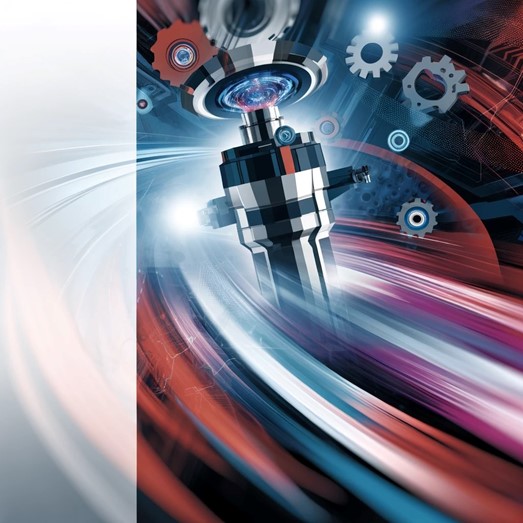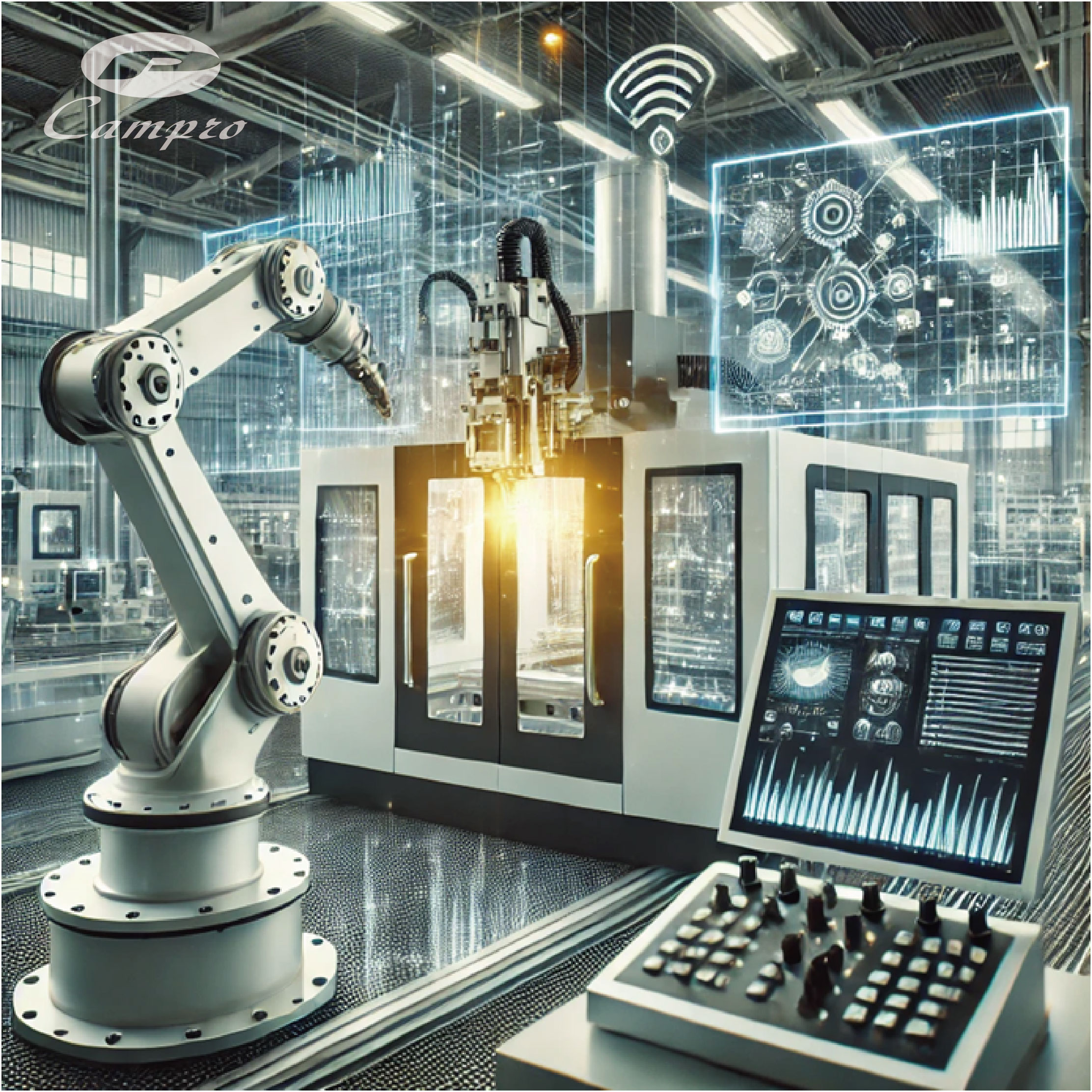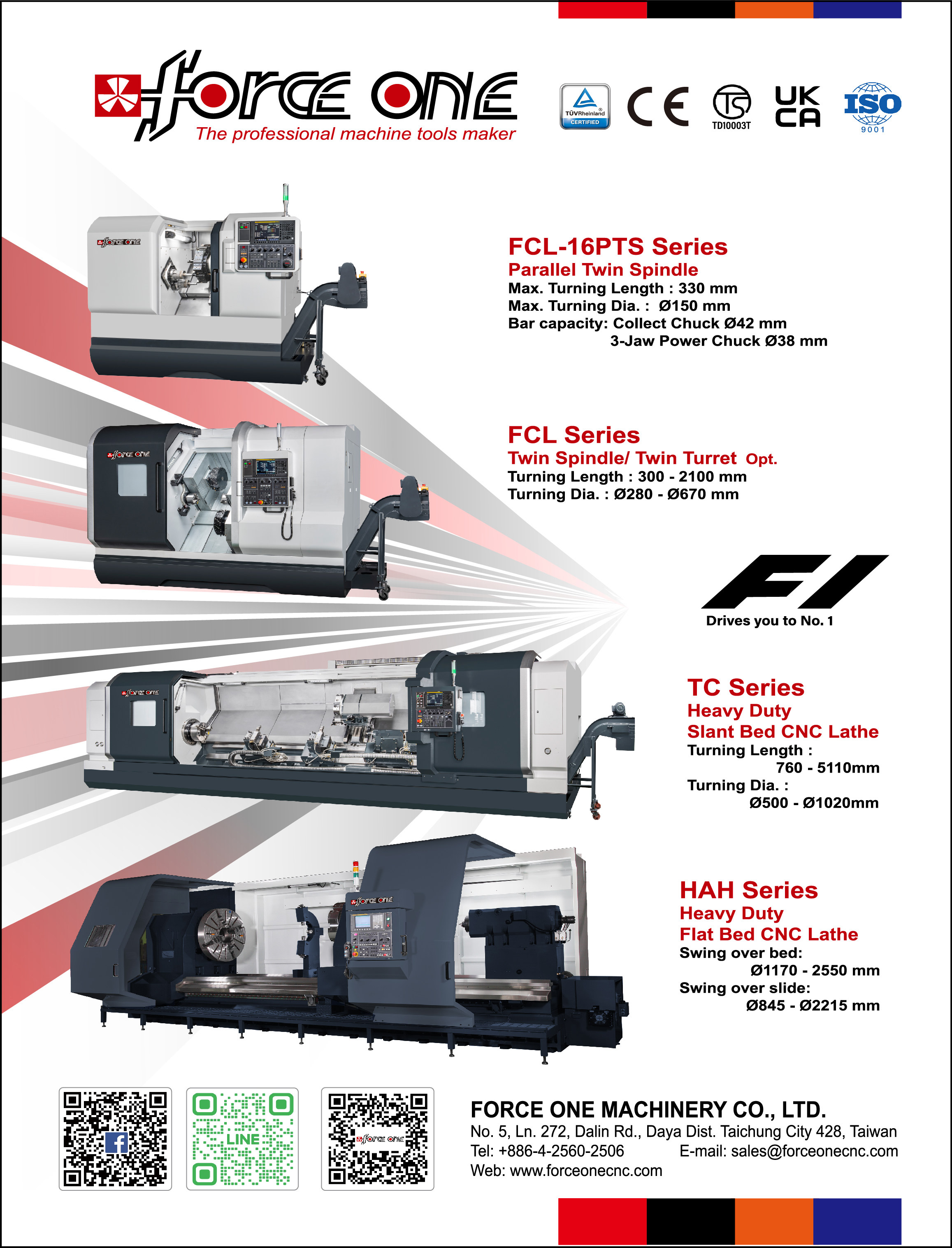Tag Result
#CNCMachining
引言:為什麼提升五軸加工中心機的效率至關重要?在當今競爭激烈的製造業中,五軸加工中心機以其出色的多功能性和靈活性,成為精密製造的重要工具。這種機器能夠在多軸同時動作的情況下進行複雜的切削任務,大幅提高了製造的精度和效率。然而,儘管擁有先進的技術,如何充分利用這些機器的能力,來提高生產效率和降低成本,仍然是許多企業面臨的挑戰。提升五軸加工中心機的效率不僅能夠縮短生產周期,降低每件產品的加工時間和成本,還能提高產品的整體質量。在快速變化的市場需求下,能够迅速調整生產設定並保持高效運作,對於保持企業競爭力至關重要。有效的機器利用率和優化的作業流程可以減少停機時間和生產瓶頸,從而實現更高的產出和更好的經濟效益。因此,了解如何最大化五軸加工中心機的效率,對於希望在市場中保持領先的製造商來說,是一個不可忽視的戰略考量。透過本文的指南,我們將探討實用的策略和技術,幫助您實現這一目標。理解您的五軸加工中心機:首要步驟要充分發揮五軸加工中心機的潛力,首先必須深入理解其核心功能及操作界面。這類機器的複雜性要求操作者不僅要有基礎的操作知識,更應該對機器的每個可調參數和功能有透徹的了解。熟悉您的設備是提升效率的關鍵步驟,因為只有充分理解機器的運作方式,才能最大限度地利用其功能,實現高效和精確的生產。為此,操作手冊是寶貴的資源,它不僅提供設備的基本操作指南,還解釋了各項功能如何協同工作以達到最佳性能。此外,多數機器製造商都會提供培訓和技術支持,幫助使用者深入了解產品。積極利用這些製造商資源,可以幫助您和您的團隊更好地掌握機器的高級功能和維護知識,從而在日常操作中提升效率。此外,定期參加由製造商舉辦的進階培訓和研討會也是提升操作技能和機器運用效率的好方法。通過這些方式,您可以確保團隊能夠不斷更新他們對設備最新技術和操作技巧的了解,進一步提高生產效率。優化機器設置以提高效率為了在生產過程中實現最高的效率和精度,對五軸加工中心機的設置進行優化至關重要。這包括根據不同的加工任務調整機器的速度、進給率和切削路徑。首先,理解加工材料的特性和加工件的要求是設置加工參數的基礎。例如,硬質材料可能需要較慢的切削速度和較低的進給率以防止工具磨損。使用先進的軟體工具來模擬加工過程是防止錯誤並節省時間的一種有效方法。這些工具可以幫助操作者預見可能的碰撞和錯誤,從而在實際加工前進行調整。此外,這些模擬工具可以詳細顯示切削路徑和工件的變形,確保加工過程中的每一步都是最優化的。透過這些策略,不僅可以提高機器的作業效率,還可以延長工具的壽命並保持產品質量的一致性。在日常操作中實施這些優化措施,將使生產過程更加流暢,減少廢品率,並提高整體生產力。4定期維護和校準:保持機器在最佳狀態定期維護和校準對於確保五軸加工中心機保持在最佳運作狀態至關重要。這不僅可以延長機器的壽命,還能保持生產效率和產品質量。維護的關鍵活動包括定期潤滑、清潔和部件檢查,這些都是防止機器故障和非計劃性停機的必要措施。首先,潤滑是任何機械維護計劃中不可或缺的一部分,它有助於減少運動部件間的摩擦和磨損。使用正確的潤滑油,並按照製造商的推薦進行定期更換,可以顯著提高機器的運行效能。其次,保持機器清潔是避免粉塵和金屬屑積聚造成損害的重要措施。清潔應涵蓋機器的內部和外部,特別是那些與加工過程直接相關的重要部件。此外,定期檢查機器的關鍵部件如刀具、主軸和導軌等,可以及早發現潛在問題並進行維修,從而避免更大的損害和更高的維修成本。這些維護活動應記錄在維護日程表中,確保按時執行,並按需調整以符合實際使用情況。通過這樣的定期維護和校準,五軸加工中心機將以最佳狀態運行,保障生產流程的連續性和效率。操作技巧與訣竅:如何最大化五軸加工中心機的性能要最大化五軸加工中心機的性能,操作者必須掌握一系列專業技巧和操作訣竅。首先,正確的刀具選擇對於實現高效和精確的加工至關重要。選擇合適的刀具不僅取決於加工材料的類型,還應考慮到加工的精度和速度要求。例如,硬質合金刀具適用於高速加工硬質材料,而鈷鋼刀具則適合精細加工。此外,了解如何利用五軸加工中心機的高級功能,如動態偏置、高速切削技術和多軸聯動,也是提升效率的關鍵。這些功能可以幫助操作者在保證加工質量的同時,顯著提高加工速度和效率。為了使操作人員能夠充分利用這些技術,進行定期的技能培訓和能力提升是非常必要的。培訓不僅應包括機器操作的基本知識,還應涵蓋高級編程技巧、刀具管理和維護操作。這樣的培訓可以幫助操作人員在實際工作中遇到問題時,能夠迅速作出反應,並有效利用機器的所有功能。透過實施這些操作技巧和培訓策略,五軸加工中心機的性能可以被最大化,進一步推動生產效率的提升,滿足日益嚴苛的市場需求。利用數據分析進行持續改進在提升五軸加工中心機的效率方面,利用數據分析是實現持續改進的關鍵策略。通過收集和分析機器操作數據,製造商可以深入了解機器性能的各個方面,從而識別出效率低下的根本原因並制定相應的改進措施。首先,實時監控系統可以捕捉到機器運行中的每一個細節,如切削速度、負荷、溫度和振動等參數。這些數據對於評估機器的運行狀態及早期識別潛在問題至關重要。例如,異常的振動模式可能表明刀具磨損或安裝不當,而這些都是降低加工精度和效率的常見原因。此外,市場上提供了多種先進的分析工具,這些工具可以對收集到的數據進行深入分析,並通過預測性維護算法預測機器故障。這不僅可以最大限度地減少非計劃停機時間,還可以確保機器維持在最佳性能狀態,進一步提高生產效率。通過這種數據驅動的方法,製造商能夠更精確地調整生產流程,優化機器設置,並確保生產過程中的每一步都是經過精心計劃和調整的。這種持續的改進過程不僅提高了生產效率,也增強了企業在市場中的競爭力。結論:將這些策略融入日常操作在本文中,我們探討了提升五軸加工中心機效率的多種策略,從深入理解設備的核心功能,到優化機器設置,再到利用數據分析進行持續改進。實施這些策略不僅可以提高生產效率,還能提升產品質量,使企業在競爭激烈的市場中保持領先。要將這些策略成功融入日常操作,首先需要建立一種文化,鼓勵創新和持續改進。這包括定期培訓員工,更新他們的技能,以及鼓勵他們對生產流程提出改進意見。其次,定期評估生產效率和質量指標,以及定期檢查設備狀態,是確保策略有效實施的關鍵。此外,透過先進的分析工具,企業可以更好地理解數據,從而做出更精確的決策,進一步提升操作效率和產品質量。這些工具能夠識別效率低下的原因,並提供實時反饋,幫助企業快速調整策略。總之,通過將這些策略融入日常操作,企業不僅能提升生產效率,還能在保證產品質量的同時,降低成本,提高整體競爭力。因此,持續改進和定期評估對於任何希望在現代製造業中成功的企業來說,都是不可或缺的元素。
PrefaceAs the global manufacturing industry enters the era of intelligentization, the application of Artificial Intelligence (AI) technology in the field of Computer Numerical Control (CNC) machining has become a major driving force for industrial advancement. Since 2016, Campro Machinery has invested in the field of intelligent machinery, starting with factory visualization management. Now, the company can provide a range of smart manufacturing factory solutions, becoming a machining solution provider capable of keeping up with the digitalization trend. This article aims to delve into how AI plays a revolutionary role in CNC machining technology, not only improving production efficiency and enhancing quality but also leading the manufacturing industry towards greater automation and flexibility. Through specific technical analysis and future trend forecasts, we will demonstrate how AI technology creates significant value in CNC machining and predict how this technological collaboration will shape the future of the manufacturing industry. Through this in-depth analysis, readers will gain a comprehensive understanding of AI's application in modern manufacturing and witness a truly meaningful industrial revolution.I. Introduction: Introducing the Revolutionary Role of AI in CNC MachiningOver the past few decades, Computer Numerical Control (CNC) technology has dramatically transformed the manufacturing industry. With continuous technological advancements, CNC machining equipment can now execute complex machining tasks with unprecedented precision and efficiency. However, as market demand increases and production scales expand, traditional CNC technology faces new challenges: how to further improve production efficiency, reduce costs, and achieve higher levels of automation and flexibility. In this context, the introduction of Artificial Intelligence (AI) technology is gradually sparking a revolution in the field of CNC machining.The core capability of AI lies in its ability to process and analyze vast amounts of data, making it a crucial player in the automation and optimization of manufacturing processes. In CNC machining, AI can be used to analyze machine operation data and adjust machining parameters in real-time to accommodate different machining conditions or material properties. This intelligent adaptability not only enhances machine operational efficiency but also significantly improves machining quality and consistency.More importantly, AI enables predictive maintenance and fault diagnosis for CNC machines. By continuously monitoring the machine's operational status and performance, AI systems can identify potential machine faults and maintenance needs, allowing for proactive intervention before issues arise. This not only extends the machine's lifespan but also significantly reduces maintenance costs and unplanned downtime.Furthermore, AI applications are driving CNC technology toward higher levels of automation. For instance, through machine learning algorithms, CNC machines can learn and optimize their machining strategies based on past machining experiences. This learning capability not only boosts machining efficiency but also enables machines to handle a wider variety of machining tasks, better adapting to changing production demands.In summary, the application of AI in CNC machining is initiating a revolution in the manufacturing industry. By integrating AI technology with CNC machines, manufacturing enterprises can enhance production efficiency and product quality while achieving greater operational flexibility and cost-effectiveness. Looking ahead, as AI technology continues to develop and improve, its impact on the CNC machining field will become even more profound, bringing more innovation and transformation to the global manufacturing industry.II. The Core Role and Implementation of AI TechnologyThe application of Artificial Intelligence (AI) in the field of CNC machining is not just a technological innovation but an industrial transformation. The core role of AI technology lies in its ability to significantly enhance machining efficiency, precision, and adaptability, all achieved through intelligent data analysis and machine learning.Firstly, AI can optimize the machining paths of CNC machines through data analysis. In traditional CNC machining, setting machining parameters often relies on the operator's experience and intuition. While this method is feasible, it may lack precision or efficiency when dealing with complex or unfamiliar machining tasks. AI technology, by analyzing past machining data, can accurately predict the optimal machining parameters, such as spindle speed, feed rate, and cutting depth, and automatically adjust these parameters to suit different material properties and machining requirements.Additionally, AI's machine learning capabilities enable CNC machines to continuously learn and improve from actual machining processes. By continuously collecting machining data, AI systems can identify any unexpected behaviors or factors that may lead to defects in the machining process and adjust machining strategies to prevent similar issues from recurring. This self-optimization capability not only improves machining consistency and quality but also reduces reliance on human intervention.AI technology also enables real-time monitoring and control of the machining process. Through various sensors installed on CNC machines, AI systems can monitor the machining status in real-time, such as tool wear, motor load, and machine vibration. This information is immediately analyzed, and AI can respond instantly to any detected abnormalities by adjusting machining parameters or pausing operations to prevent damage and ensure the quality of the final product.Through these advanced functionalities, AI not only elevates the technical level of CNC machining but also greatly enhances the intelligence and automation of production processes. As these technologies continue to develop and be applied, AI will play an increasingly important role in the field of CNC machining, driving the manufacturing industry toward a more efficient and precise future.III. Enhancing Production Efficiency and Reducing WasteIn modern manufacturing, enhancing production efficiency and reducing resource waste are crucial goals for the sustainable development of enterprises. The application of Artificial Intelligence (AI) in CNC machining technology provides an efficient and sustainable solution to achieve these goals. AI not only improves operational efficiency but also reduces material and energy waste through intelligent process optimization.Firstly, AI can significantly enhance the production efficiency of CNC machines. Through predictive maintenance and fault warning systems, AI can analyze machine operation data to predict mechanical failures and maintenance needs, thereby reducing unexpected machine downtime. This predictive capability not only ensures optimal machine operation but also effectively extends equipment lifespan, reducing economic losses caused by sudden failures. Additionally, AI's real-time adjustment functionality can automatically optimize machine operating parameters, such as speed and cutting force, during the machining process to adapt to different conditions. This not only increases production speed but also reduces material waste and energy consumption.Secondly, AI plays a critical role in reducing material waste. Through precise data analysis, AI can optimize cutting paths and material configurations to ensure the most efficient use of every piece of raw material. This not only enhances material utilization but also reduces waste generated during the production process. In the machining of high-value materials, such as aerospace aluminum or titanium alloys, this optimization is particularly important as material costs represent a significant portion of the overall production cost.Moreover, AI excels in energy management. It can intelligently regulate machine energy consumption based on actual production demands, such as automatically lowering energy usage during low-load periods or maximizing the use of low-energy modes without affecting production efficiency. This intelligent energy management not only reduces operational costs for enterprises but also contributes to environmental protection.In summary, the application of AI in CNC machining brings considerable economic and environmental benefits by enhancing production efficiency and reducing waste. This allows enterprises to respond more effectively to market changes and demands, driving the entire industry towards a more sustainable and intelligent future.IV. Quality Control and Process MonitoringIn modern manufacturing, ensuring product quality and monitoring the stability of the production process are of paramount importance. The application of AI technology in CNC machining not only enhances production efficiency but also significantly improves the accuracy of quality inspection and the real-time monitoring of processes. This technological innovation makes the manufacturing process more reliable, greatly reduces the production of defective products, and ensures the consistency of product quality.AI systems can utilize advanced sensing technologies and data analysis to monitor the machining status of CNC machines in real time. This includes monitoring tool wear, the dimensional accuracy of workpieces, and mechanical feedback during the machining process. With this data, AI can instantly detect any abnormalities that could lead to quality issues, such as excessive tool wear or deviations in machining parameters. Once these issues are detected, AI systems can automatically adjust machine parameters or pause the machining process until the problems are resolved, ensuring that every product meets high-quality standards.Furthermore, the application of AI enhances product consistency during the manufacturing process. In large-scale production, even minor variations can result in significant quantities of non-conforming products. AI systems can learn and record the successful machining conditions of each production run and apply these conditions to subsequent production, ensuring that all products meet the same high standards. This not only reduces quality fluctuations but also boosts customer confidence in the product quality.AI also plays a crucial role in reducing human errors. In traditional CNC operations, human factors often lead to product quality issues. The introduction of AI allows for the automation of many decisions and operations, reducing the likelihood of human errors. For instance, AI systems can automatically execute complex machining programs, reducing the need for manual adjustments by operators, thereby lowering error rates and enhancing overall product quality.In summary, the application of AI technology in quality control and process monitoring brings revolutionary improvements to the CNC machining field. Through real-time monitoring and intelligent adjustments, AI not only enhances product quality but also increases the stability and reliability of the manufacturing process. For modern manufacturing industries striving for defect-free production and high customer satisfaction, this holds immeasurable value.V. Future Prospects and Industry ApplicationsAs AI technology continues to develop and improve in CNC machining, its future application prospects appear even broader and more profound. AI will not only enhance existing manufacturing processes but also create new industry applications, leading the manufacturing sector towards greater efficiency, higher precision, and increased intelligence. Below are some important future prospects and potential industry applications of AI in CNC machining.Firstly, the further development of AI will make CNC machining more intelligent and automated. With advancements in machine learning and data analysis capabilities, future CNC machines will be able to more accurately predict machining outcomes and autonomously adjust machining strategies to meet complex and changing production requirements. This adaptive machining capability will not only improve production efficiency but also ensure product quality across various production scenarios.Additionally, AI will promote the application of CNC machining technology in more industries. For example, in the aerospace and automotive manufacturing sectors, where precision and reliability of parts are critical, AI-driven CNC technology can provide higher machining precision and better material utilization. In the medical industry, precision CNC machining can be used to manufacture highly complex medical instruments and implants, and the application of AI can ensure these products meet stringent safety and performance standards.The development of AI technology also drives CNC machining towards green manufacturing and sustainable development. By optimizing machining paths and energy control, AI helps reduce energy consumption and minimize waste generated during the production process. This not only helps manufacturing industries lower operational costs but also aligns with global environmental protection and sustainable development trends.With the integration of Internet of Things (IoT) technology, future CNC machining will become smarter and more interconnected. Various machines and production equipment in factories will be networked, allowing for real-time data exchange and analysis. This will enable comprehensive monitoring and management of the production process and coordinate production activities globally, enhancing overall operational efficiency.In summary, the further development of AI will bring significant changes and limitless possibilities to the field of CNC machining. From improving production efficiency to expanding new application areas, from enhancing quality control to promoting sustainable manufacturing, AI will play an increasingly important role in the future of manufacturing, bringing profound impacts to the global manufacturing industry.VI. Conclusion: Long-Term Prospects for the Collaboration between AI and CNC MachiningWith the widespread application of Artificial Intelligence (AI) technology in the manufacturing industry, especially in the field of CNC machining, we are witnessing a technological revolution that not only changes production methods but also redefines industrial standards. AI's contributions to enhancing CNC machining technology are significant, with promising and lasting prospects for collaboration. This is evident not only in the improvements in production efficiency and quality control but also in how AI is driving the manufacturing industry towards a smarter, greener, and more efficient future.Firstly, AI has already achieved remarkable success in improving the efficiency and precision of CNC machining technology. Through real-time data analysis and machine learning, AI systems can optimize machining processes, reduce equipment failures, and minimize production interruptions, thereby lowering production costs and improving product quality. This technological advancement benefits individual enterprises and enhances the overall competitiveness of the manufacturing industry.Moreover, the application of AI fosters continuous innovation in the manufacturing industry. As technology evolves, new AI algorithms and learning models are being developed, enabling CNC machines to handle more complex tasks and providing higher adaptability and better user experiences. This not only promotes further technological development but also brings new business opportunities and market potential to the manufacturing industry.The ongoing integration of AI technology is also pushing the manufacturing industry towards sustainable development. Through more precise data analysis and energy management, AI helps achieve more environmentally friendly production processes, reducing energy consumption and waste generation. This responds to global calls for environmental protection and aligns with the long-term development strategies of enterprises.Finally, as the global economic and technological environment evolves, the integration of AI and CNC machining technology will continue to deepen. This technological collaboration is not only a driving force for the modernization of the manufacturing industry but also key to realizing the long-term development strategies of enterprises. In the future, we can foresee AI playing an increasingly important role in improving production efficiency, reducing costs, enhancing product quality, and exploring innovative fields.In conclusion, the combination of AI and CNC machining technology brings revolutionary changes to today's manufacturing industry and lays a solid foundation for future development. This ongoing collaboration will ensure that the manufacturing industry can maintain innovation and competitiveness while continuously driving industrial progress and economic growth in the face of future challenges.ConclusionThrough this comprehensive exploration of the application of Artificial Intelligence (AI) in CNC machining technology, we can clearly see that AI is not only a driving force in modern manufacturing but also a key to future innovation and development. AI's achievements in enhancing machining efficiency, precision, and quality control have already demonstrated its irreplaceable value. Looking ahead, as technology continues to advance, AI will play an even more crucial role in the CNC machining field. It will not only propel the manufacturing industry towards higher efficiency and precision but also accelerate the transition towards sustainable and intelligent manufacturing. Through continuous technological innovation and strategic application, the combination of AI and CNC machining technology will continue to have a profound impact on the global manufacturing industry, ensuring that enterprises remain at the forefront in the competitive market.
We use cookies to optimize and continuously update it according to your needs.The settings can be changed at any time under "Privacy"











